Environmental Cultures in Soviet East Europe: Literature, History and Memory: Environmental Cultures
Autor Dr Anna Barczen Limba Engleză Paperback – 29 iun 2022
| Toate formatele și edițiile | Preț | Express |
|---|---|---|
| Paperback (1) | 198.82 lei 6-8 săpt. | |
| Bloomsbury Publishing – 29 iun 2022 | 198.82 lei 6-8 săpt. | |
| Hardback (1) | 569.29 lei 6-8 săpt. | |
| Bloomsbury Publishing – 9 dec 2020 | 569.29 lei 6-8 săpt. |
Din seria Environmental Cultures
- 23%
 Preț: 197.05 lei
Preț: 197.05 lei - 23%
 Preț: 191.13 lei
Preț: 191.13 lei - 23%
 Preț: 197.34 lei
Preț: 197.34 lei - 30%
 Preț: 508.70 lei
Preț: 508.70 lei - 22%
 Preț: 230.79 lei
Preț: 230.79 lei - 24%
 Preț: 196.36 lei
Preț: 196.36 lei - 7%
 Preț: 142.65 lei
Preț: 142.65 lei - 22%
 Preț: 128.11 lei
Preț: 128.11 lei - 30%
 Preț: 509.76 lei
Preț: 509.76 lei - 23%
 Preț: 190.68 lei
Preț: 190.68 lei - 30%
 Preț: 567.25 lei
Preț: 567.25 lei - 30%
 Preț: 569.06 lei
Preț: 569.06 lei - 22%
 Preț: 237.28 lei
Preț: 237.28 lei - 13%
 Preț: 230.03 lei
Preț: 230.03 lei - 23%
 Preț: 198.12 lei
Preț: 198.12 lei - 13%
 Preț: 229.24 lei
Preț: 229.24 lei - 23%
 Preț: 197.77 lei
Preț: 197.77 lei - 23%
 Preț: 198.05 lei
Preț: 198.05 lei - 24%
 Preț: 196.08 lei
Preț: 196.08 lei - 30%
 Preț: 540.07 lei
Preț: 540.07 lei - 13%
 Preț: 238.58 lei
Preț: 238.58 lei - 30%
 Preț: 509.93 lei
Preț: 509.93 lei - 22%
 Preț: 225.59 lei
Preț: 225.59 lei - 23%
 Preț: 221.63 lei
Preț: 221.63 lei - 30%
 Preț: 773.81 lei
Preț: 773.81 lei - 22%
 Preț: 226.42 lei
Preț: 226.42 lei - 30%
 Preț: 509.93 lei
Preț: 509.93 lei - 22%
 Preț: 230.24 lei
Preț: 230.24 lei - 23%
 Preț: 255.76 lei
Preț: 255.76 lei - 13%
 Preț: 239.32 lei
Preț: 239.32 lei - 22%
 Preț: 237.28 lei
Preț: 237.28 lei
Preț: 198.82 lei
Preț vechi: 258.44 lei
-23% Nou
Puncte Express: 298
Preț estimativ în valută:
38.04€ • 39.64$ • 31.50£
38.04€ • 39.64$ • 31.50£
Carte tipărită la comandă
Livrare economică 03-17 aprilie
Preluare comenzi: 021 569.72.76
Specificații
ISBN-13: 9781350200647
ISBN-10: 1350200646
Pagini: 250
Ilustrații: 11 bw illus
Dimensiuni: 156 x 234 x 17 mm
Greutate: 0.39 kg
Editura: Bloomsbury Publishing
Colecția Bloomsbury Academic
Seria Environmental Cultures
Locul publicării:London, United Kingdom
ISBN-10: 1350200646
Pagini: 250
Ilustrații: 11 bw illus
Dimensiuni: 156 x 234 x 17 mm
Greutate: 0.39 kg
Editura: Bloomsbury Publishing
Colecția Bloomsbury Academic
Seria Environmental Cultures
Locul publicării:London, United Kingdom
Caracteristici
Covers a wide range of historical, literary and film texts, including work by Christa Wolf, Svetlana Alexievich and Béla Tarr
Notă biografică
Anna Barcz holds a PhD in literary studies from the Institute of Literary Research of the Polish Academy of Science in Warsaw where she currently works as an Assistant Professor; she was the Marie Sklodowska-Curie Fellow at the Trinity Long Room Hub (Trinity College Dublin) in 2018-2019, and Rachel Carson Centre Fellow (LMU, Munich) in 2019-2020. She is the author of books: Ecorealism: From Ecocriticism to Zoocriticism in Polish Literature (in Polish, 2016), and Animal Narratives and Culture: Vulnerable Realism (2017).
Cuprins
IntroductionPart I Unknownland: Retelling the Environmental History of Soviet Eastern Europe through Literature and Cultural MemoryChapter 1 Narrating History across BordersChapter 2 History and LiteratureChapter 3 Environmental History Chapter 4 Cultural and Environmental MemoryPart II The Tired Village Chapter 1 Historical BackgroundChapter 2 Fatigue: Platonov's Pit and the StalinoceneChapter 3 The Rural World is Gone: Peasants' Voices Chapter 4 Satantango: Interconnecting the Human and Ecological Worlds Part III The Earth's MemoryChapter 1 Mining Narratives and Their Historical Background Chapter 2 Unearthing the Story of Coal: DrachChapter 3 The Uranium Narrative: History of a Disappearance Part IV The Persistence of Chernobyl in Cultural MemoryChapter 1 Eastern European Risk Narrative: Chernobyl MemorialChapter 2 Contaminated Language: Wolf's AccidentChapter 3 The Bees Knew: Alexievich's ChroniclePart V Disturbed LandscapesChapter 1 Non-sites of Memory and the Violation of NatureChapter 2 Greening Sites of MemoryChapter 3 Bialowieza Forest across Eastern Europe's Borders BibliographyIndex
Recenzii
[A] fascinating and productive read, tacking back and forth among the fields of Ecocriticism, Soviet Environmental History, and the History of Memory ... Environmental Cultures will reward a wide variety of readers with interests in environmental history, literary criticism, and environmental policy.
This book shows dazzling evidence of Anna Barcz's ability to integrate concepts and ideas from so many disciplines. And especially in the final chapters on Chernobyl and memory studies, we find some profoundly elegiac writing. This is a hugely ambitious book based on really delicate and persuasive readings of texts (including film) combined with (dis-)passionate writing controlled but deeply engaged.
The close readings are generally insightful and often penetrating... The broad topics of each of the four overarching case studies are well chosen, as are the literary texts addressed in each.
This book shows dazzling evidence of Anna Barcz's ability to integrate concepts and ideas from so many disciplines. And especially in the final chapters on Chernobyl and memory studies, we find some profoundly elegiac writing. This is a hugely ambitious book based on really delicate and persuasive readings of texts (including film) combined with (dis-)passionate writing controlled but deeply engaged.
The close readings are generally insightful and often penetrating... The broad topics of each of the four overarching case studies are well chosen, as are the literary texts addressed in each.
